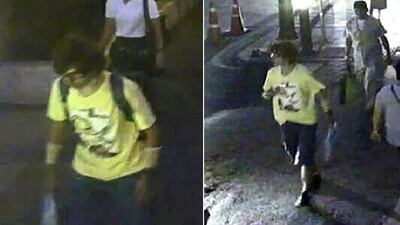The fear in Bangkok is that Monday’s bomb attack on a downtown shrine heralds a new threat of terrorism in Thailand. The country’s top general, Prayut Chan-ocha, who ascended to power in a coup in May last year, has condemned the attack, which claimed at least 20 lives, as the worst in Thailand’s history.
The country has been embroiled in political violence for nearly a decade following former prime minister Thaksin Shinawatra’s removal in a 2006 coup, with tumultuous protests and elections in the interim. In 2010, a bloody crackdown on Thaksin’s “red shirt” supporters at a Bangkok park ended with at least 98 people killed, thousands injured and an upscale shopping mall destroyed in a fire.
While it is too early to conclusively identify the perpetrators of Monday’s attack, there is a growing consensus in the Thai media that this is not simply another, particularly tragic, outbreak of political turmoil. The target of the attack – the Erawan Shrine in Bangkok’s central Ratchaprasong district – strongly indicates a foreign terrorist agenda. The Hindu shrine is popular among Asian tourists and Thais, with deep religious significance in this Buddhist-majority country, making it an unlikely target in Thailand’s internal disputes.
As Pavin Chachavalpongpun, an associate professor at Kyoto University, wrote for the BBC yesterday, both the location of the attack and the scale of the atrocity argue against it being perpetrated by a domestic agent. Bangkok has been troubled by smaller bomb and grenade attacks as recently as during the protests that preceded the 2014 coup, but the size of this detonation and its clear agenda to target tourists, with nine foreigners counted among the dead, is unprecedented in Thailand’s recent history.
The national police chief Somyot Poompanmoung told the Associated Press yesterday that investigators suspected the attack had been carried out by a terrorist network in the country. The key piece of publicly available evidence is CCTV footage showing a young man wearing a large backpack walk into the shrine and then depart quickly, only minutes before the detonation. The man, whom police have described as “Middle Eastern looking”, according to local media, is now the subject of a massive manhunt with artist renderings of a dark, shaggy-haired and bespectacled young man airing on all the local television stations.
A further disturbing development on Tuesday occurred when an assailant threw an explosive device at a busy commuter pier at the Saphan Taksin bridge across Bangkok’s Chao Phaya River. According to police, the attacker missed the target and the bomb was deflected into the river, where it detonated harmlessly. While police have refrained from directly linking the two attacks at this preliminary stage of the investigation, the second incident sowed further fears that Bangkok may now be in the crosshairs of a concerted terrorist campaign.
Quite rightly, Gen Prayut has refused to speculate about who the perpetrators of the Erawan attack might be. The local media, however, has not been so reticent. The prevailing theory is that the bombing may have been retribution for Bangkok's controversial deportation to China of 109 Uighur dissidents in July. Human rights groups condemned the move on the grounds that the Uighurs may face persecution at the hands of Chinese authorities. The day after the deportation, The Bangkok Post ran a chilling front-page photo of the Uighurs seated on a plane with black hoods obscuring their faces, each accompanied by Chinese security personnel.
Particularly since the recent coup, Thailand has pursued a non-confrontational foreign policy. A key US ally in the region, the country has been accused of hosting CIA “black sites” during the Bush administration’s “war on terror”, but generally Bangkok tries to present a more neutral face as it confronts its own decades-old insurgency in the Muslim-majority south.
Authorities have so far refrained from connecting the recent attacks to the sporadic violence in the three southernmost provinces.
Yet the country, well known for its open and tolerant society, has been drawn into the skein of international terrorism before. In 2012, Thai authorities arrested alleged Hizbollah agents who were accused of plotting attacks against Israeli targets in Bangkok. The most notable arrest was in 2003, when Riduan Isamuddin, also known as Hambali, was caught in the historic city of Ayutthaya. The arrest of Hambali, who was accused of planning the 2002 Bali bombings, was widely seen as a crippling blow to the south-east Asian terrorist network Jemaah Islamiyah.
For Thailand, the Erawan attack was not only a tragedy for the victims and an assault against a revered shrine, but a threat to the country’s welfare as a whole. The stock exchange fell by 3 per cent in the subsequent two days and there are still prevailing concerns that Thailand’s vital tourism sector will suffer.
In recent years, that sector has seen increasing inflows both from China and the Arabian peninsula. In downtown’s main Sukhumvit area, just blocks from the Erawan Shrine, Arab families with parents dressed in kanduras and abayas are a common sight as the hospitality industry has catered for halal and Muslim-orientated holidays. It is a remarkable sign of Thailand’s gracious and welcoming society.
As the country's military-led government grapples with this new threat, it is essential that the response is both firm and measured. It is the aim of terrorists everywhere to disrupt such open societies by provoking a backlash. Thailand is stronger than that. On this occasion, as The Bangkok Post wrote in its lead editorial, "we are all Thais".
Jeremy Walden-Schertz is a former comment editor of The National and former foreign editor of The Bangkok Post. He is a recent graduate of the school of global policy and strategy at UC San Diego.

